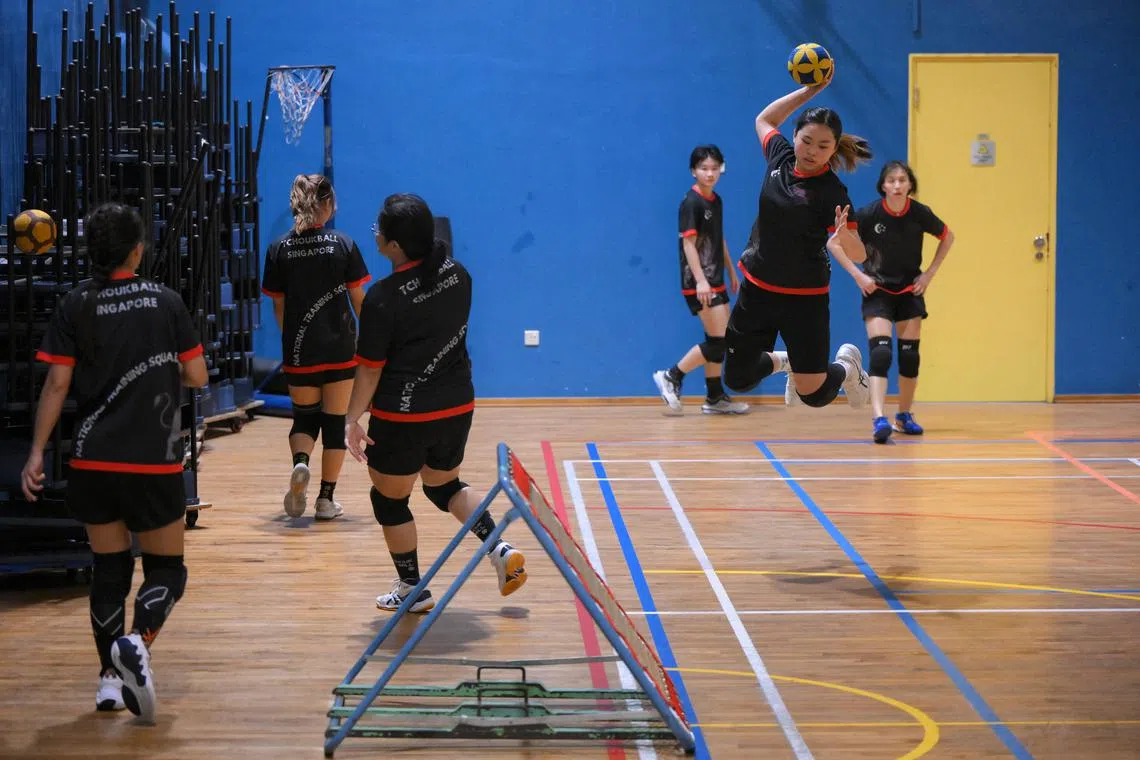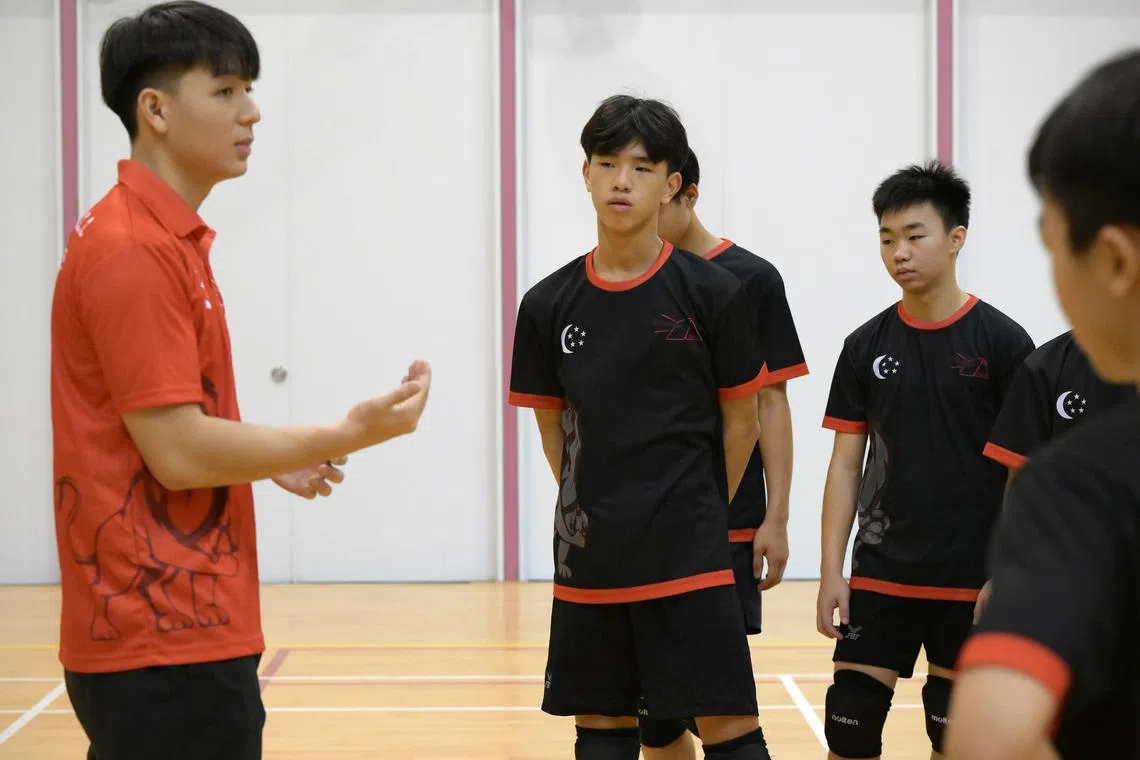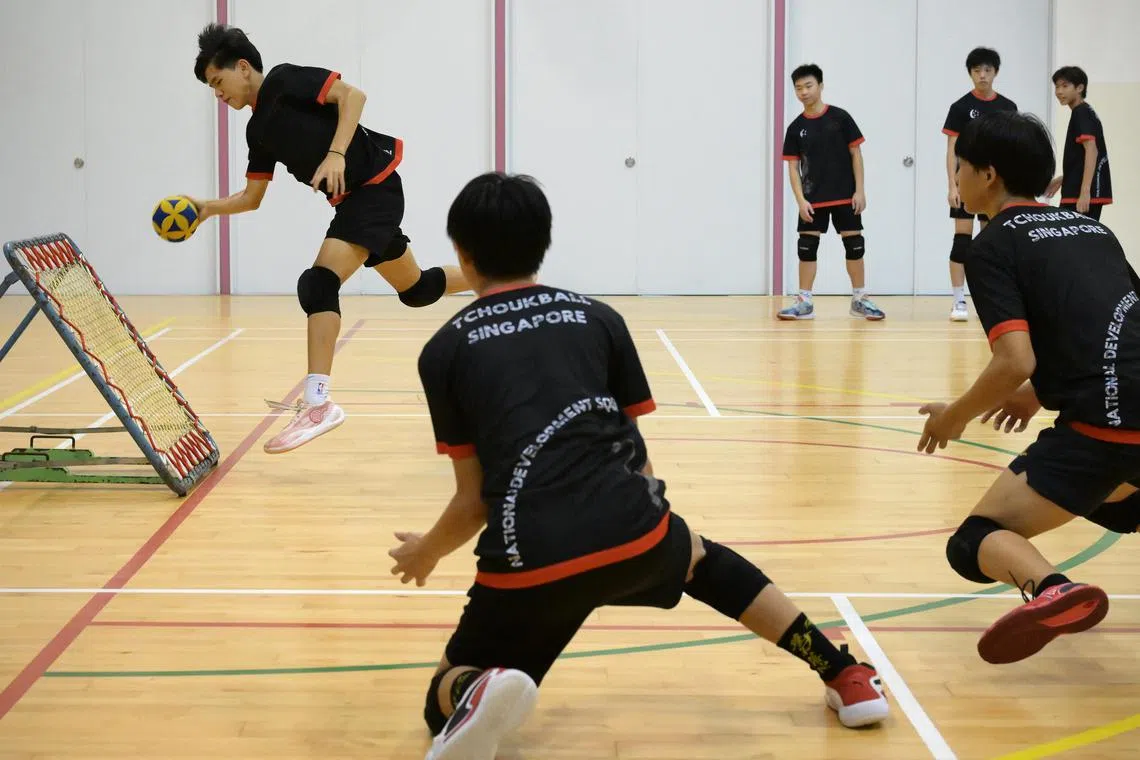ST Sports’ Play of the Month – Tchoukball
In a special series, Play of the Month, The Straits Times’ sports desk will dive into a sport. Every month this year, an expert in a sport will provide tips for readers. The June spotlight is on tchoukball.
Sign up now: Get the biggest sports news in your inbox

National tchoukball player Angelina Tan (right) is delighted to have the team crowned world No. 1 in her debut season.
ST PHOTO: MARK CHEONG
SINGAPORE – When Angelina Tan first donned the national jersey at 11, the then-national youth tchoukball player never imagined that she would one day be part of the world’s No. 1 women’s team.
That moment, which came on her senior debut in 2022 after they beat world champions Chinese Taipei for the top spot in the Asia Pacific Tchoukball Championships, was a special one for her.
The 20-year-old said: “We have never won against Chinese Taipei, even in the youth categories. They were always the one dominating the sport and in 2022 we got the gold medal and that was quite memorable.
“We definitely felt happy, because we’ve trained so long… It was a reward for our efforts.”
Like many others in the tchoukball fraternity, her journey was ridden with ups and downs – the players had to fork out their own money for overseas trips, competition fees and jerseys in the early days.
The situation has improved since the Tchoukball Association of Singapore became a national sports association and players now receive subsidies when they travel to compete for Singapore.
The sport has also become better known here, particularly among the younger crowd who are introduced to it during physical education classes in school.
Developed in Switzerland in the 1970s, tchoukball is a non-contact indoor team sport that takes its inspiration from handball, volleyball and squash.
Two teams of seven players each compete for points by rebounding a ball off a frame, also known as a rebounder. Players have to take on roles in attack and defence. Games last for three periods of 15 minutes, with a maximum five-minute interval in between periods.
It has picked up in popularity here, with approximately 3,500 active players. Although not all primary and secondary schools offer the sport, all tertiary institutions and universities have it as a co-curricular activity.
For Tan, her love for tchoukball also inspired her older siblings to pick up the sport.
Her sister Alyssa, 21, started playing in 2017 while her brother Austin, 23, began a year later. They now play for their respective university teams.
Tan added: “For my family, because I have played for so many years, they sent me to training, they definitely supported me.
“Occasionally we play together around our house as we have tchoukball equipment at home.”

Men’s national player Ivan Ng (left) picked up tchoukball because it is a non-contact sport.
ST PHOTO: NG SOR LUAN
National men’s player Ivan Ng, 23, also started playing when he was in primary school.
He said: “I played football initially but decided to go with tchoukball as it is a non-contact sport. I like how the sport is played, how you are required to jump in and shoot, it’s not a common sport like basketball.”
As tchoukball is a non-contact sport, Ng added that it is suitable for all ages because “it is actually quite safe, all they’re required to do is just practise and have hand-eye coordination”.
Keane Yap, captain of the U-15 boys’ team, decided to give it a try after seeing his seniors play and thought “it looked really cool”.
The 15-year-old said: “I like the shooting aspect, and also the defence as well. I find catching other people’s shots quite challenging.”

Players have to perform a dual role in tchoukball – to attack and defend.
ST PHOTO: NG SOR LUAN
Since becoming world No. 1, the women’s team – who are now ranked fourth – have garnered more media attention and Tan noted that there is more pressure on the team to deliver results.
After winning gold at the Asia Pacific championships in 2022, they were named Team of the Year at the 2023 Singapore Sports Awards, where they collected the $10,000 cash award.
Like the sport of tchoukball, they paid it forward with a rebound – by donating part of the sum back to the association as Tan noted that “we received a lot from the association, so it’s like giving back and it will return to us in some way”.
Three tips from the pros
Timing for shooting – Timing is key in tchoukball, players must shoot before landing in the forbidden zone.
Overhand throws – Practise overhand throws as they are more efficient and accurate for shooting and passing.
Sliding – Players are required to wear knee pads when playing so they have to learn to slide on them to catch and save the ball.
Fun fact
The name tchoukball was derived from the “tchouk” sound made by the ball rebounding off the frame.


